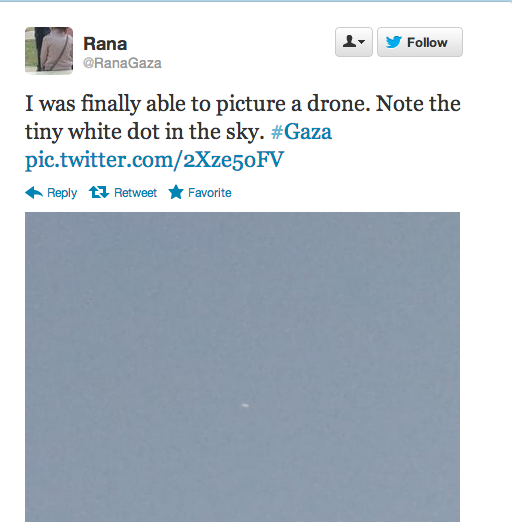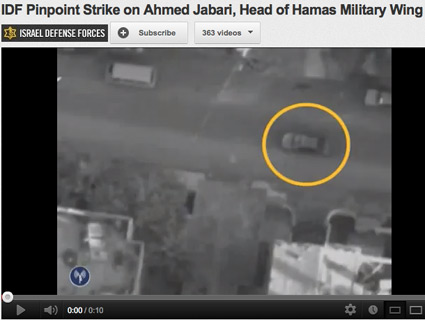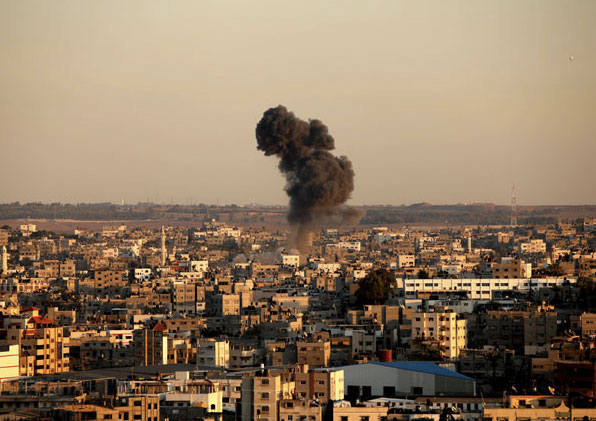
Smoke rises after an Israeli air strike in Gaza on November 15. © Majdi Fathi/APA Images/ZUMAPRESS.com
Read on for essential background on the escalating conflict or click here for the latest update. Previous updates are here:
- UPDATE 1: 1:00 p.m. PST, Thursday, November 15
-
UPDATE 2: 7:40 a.m. PST, Friday, November 16
-
UPDATE 3: 10:30 a.m. PST, Friday, November 16
-
UPDATE 4: 1:00 p.m. PST, Friday, November 16
-
UPDATE 5: 6:00 a.m. PST, Saturday, November 17
-
UPDATE 6: 9:30 a.m. PST, Saturday, November 17
-
UPDATE 7: 8:30 a.m. PST, Sunday, November 18
-
UPDATE 8: 7:00 a.m. PST, Monday, November 19
-
UPDATE 9: 9:40 a.m. PST, Monday, November 19
-
UPDATE 10: 1:30 p.m. PST, Monday, November 19
-
UPDATE 11: 7:00 a.m. PST, Tuesday, November 20
-
UPDATE 12: 11:30 a.m. PST, Tuesday, November 20
-
UPDATE 13: 6:00 a.m. PST, Wednesday, November 21
What’s happening? On Wednesday, the Israeli government launched airstrikes on Gaza, the largest city in Palestinian territories. The initial Israeli strikes killed Ahmed al-Jaabari, the top military leader of Hamas, which has controlled the Gaza strip since 2007. This was the most significant attack on Gaza by Israeli forces since the Gaza war (Operation Cast Lead), which lasted for three weeks during 2008 and 2009. According to White House Deputy National Security Adviser Ben Rhodes, the precipitating factor of this latest conflict is Hamas rockets, which have been fired into Israeli civilian areas and terrority “for some time.”
Hostilities inched towards full-blown war on Thursday, when a Hamas rocket killed at least three Israelis and Hamas launched rockets at Tel Aviv in the first attack on the Israeli city in 20 years. On Friday, hostilities escalated when Palestinian militants fired rockets on Jerusalem for the first time. Israel, targeting what it called terror sites, killed at least 39 Palestinians (including some civilians) through Saturday, according to the BBC. As Israel and Gaza exchanged strikes, the threat of a ground invasion loomed, with Israel considering calling up 30,000 reserve troops.
Why now? According to the New York Times, Israel has been fed up with Gaza for quite some time, and is ready to continue hostilities:
[Israel] has absorbed more than 750 rockets fired from Gaza into southern Israel this year. The rockets have hit homes, caused injuries and frightened the population. On Saturday [November 10], Gaza militants fired an antitank missile at an Israeli Army Jeep patrolling the Israel-Gaza border, injuring four soldiers. Both the rocket fire and the buildup of advanced weaponry in Gaza have increasingly tested Israeli officials and prompted such an intense attack, according to military experts in Israel.
Here’s another explanation: Prime Minister Benjamin Netanyahu is running for reelection on January 22, and the strike against Hamas leader Jaabari is seen as advantageous for his campaign. Avi Benayahu, a former Israel Defense Forces spokesman, told the Daily Beast that the operation is Netanyahu’s equivalent to Obama’s strike on Osama bin Laden.
This isn’t the first time that Israel has launched a strike on Gaza before general elections. Netanyahu became prime minister due to the February 2009 election, which took place not long after the Gaza war ended on January 18.
Israel and Egypt issued an economic blockade against Gaza in 2006, when Hamas took power there. This severely restricted Gaza exports and imports. The blockade, which drew criticism from the international human rights community, was eased in 2010, but rockets attacks continued intermittently. Hamas is looking to be regarded as the main representative for Palestinians.
Before the strike against the Hamas military leader, tensions escalated on November 11 when Palestinians claimed the Israeli military fatally shot a 13-year-old boy (the Israeli military did not confirm the shooting). For a good timeline of events leading up to the latest conflict, check out this post by Emily Hauser in The Atlantic. Hamas views these episodes as an Israeli offensive and wants to send a message that Gaza is not “an easy bone,” as Hamas’ deputy foreign minister put it. The New York Times points out that Hamas is looking for a diplomatic win, by demonstrating to allies in the Arab world and elsewhere—including Turkey, Egypt, and Qatar—that its leadership is stronger than the politically gutted Palestinian Authority, which rules the West Bank. Egypt has asked the US government to intervene to stop the conflict.
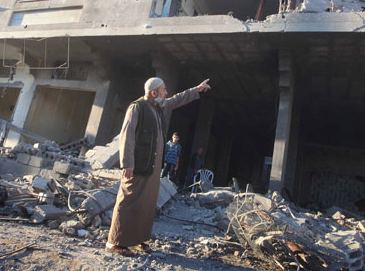
Damage in the Gaza Strip © Majdi Fathi/APA Images/ZUMAPRESS.com
How will a compromise be reached? Tony Blair, the former British prime minister, is an envoy for the Middle East Quartet, which is comprised of the United States, the European Union, the United Nations, and Russia. Here’s what he told CNN on Thursday:
The rockets have got to stop coming out of Gaza, and then the Israeli military action cease. And then we can try and find our way forward. But I don’t think we should be of any doubt at all that if this situation continues and it escalates, it’s going to be really serious and tragic—not just for Israelis and Palestinians, but actually it will cause a huge amount of upheaval right across the region, and this is a region, as you know, that doesn’t require more upheaval right now.
What does social media have to do with it? The Israeli army has been using social media to publicize the attacks. Here is a screenshot from Facebook (the identities of the people tagged in the post are unclear)
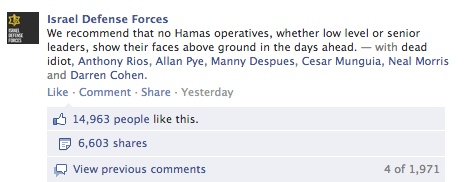
There’s been a “Twitter War” between the Israeli military and the account of Hamas’ Al-Qassam Brigades:
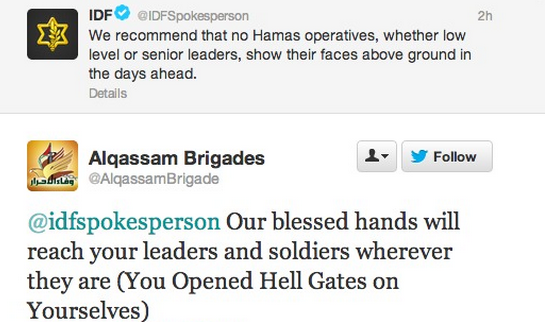
A screenshot of the attack posted on YouTube, courtesy of Mother Jones’ Asawin Suebsaeng
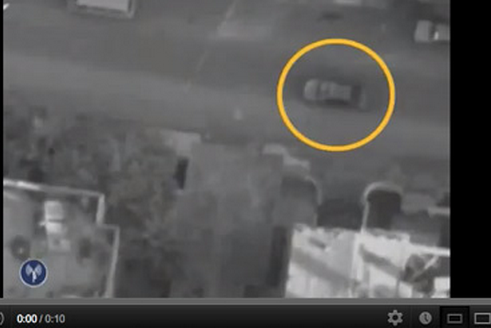
What does President Obama say? President Obama spoke with Netanyahu and Egyptian President Mohamed Morsi on Wednesday. The president reiterated America’s support for Israel’s right to self-defense and urged Netanyahu to avoid civilian casulaties as much as possible.
“We strongly condemn the barrage of rocket fire from Gaza into Israel, and we regret the death and injury of innocent Israeli and Palestinian civilians caused by the ensuing violence,” Jay Carney, the White House press secretary, said on Thursday. “There is no justification for the violence that Hamas and other terrorist organizations are employing against the people of Israel. We call on those responsible to stop these cowardly acts immediately in order to allow the situation to deescalate.”
” 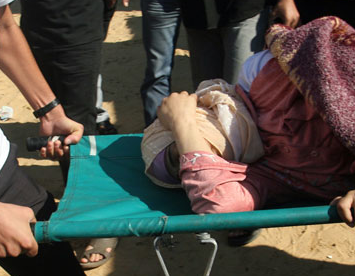
Palestinian medics treat a wounded woman at a hospital after an Israeli air strike in Khan Younis in the southern Gaza Strip. (Credit Image: © Eyad Al Baba/APA Images/ZUMAPRESS.com)
What does the US State Department say? “Hamas claims to have the best interests of the Palestinian people at heart, yet it continues to engage in violence that is counterproductive to the Palestinian cause,” State Department spokesman Mark Toner said on Wednesday. “Attacking Israel on a near daily basis does nothing to help Palestinians in Gaza or to move the Palestinian people any closer to achieving self determination.”
Whom should you be following for more information? Reuters is running a live blog on the conflict. For Twitter accounts check out @acarvin, the senior strategist at NPR who is providing live updates; @JonDonnison, a BBC Gaza and West Bank correspondent who is providing updates on the strikes on Gaza; @pdanahar, the BBC Middle East Bureau Chief; and @LaurenBohn, an Associated Press reporter who covers Israel. You can also see a Twitter list of the whole BBC staff covering the conflict here. You can also check out the Israeli military account, @IDFSpokesperson the account of Hamas’ Al-Qassam Brigades.
UPDATE 1, 1:00 p.m. PST, Thursday, November 15:
Gigantic explosions and fireballs just now in #Gaza. Planes sweeping low over Gaza City.#Israel
— Noah Browning (@sheikhNB) November 15, 2012
UPDATE 2, 7:40 a.m. PST, Friday, November 16: There are unconfirmed reports that Hamas is aiming rockets at Jerusalem, according to ABC News. This would be the first time that Hamas rockets have been aimed at the city. The Egyptian prime minister, Hisham Kandil, is expected to go to Gaza today to speak with Hamas leaders. This move comes after President Obama pressured Egypt on Wednesday to take action to protect the Camp David peace accords, the peace deal between Egypt and Israel that President Jimmy Carter brokered in 1978.
The New York Times reports that early Friday, Israel called up 16,000 troops.
UPDATE 3, 10:30 a.m. PST, Friday, November 16:
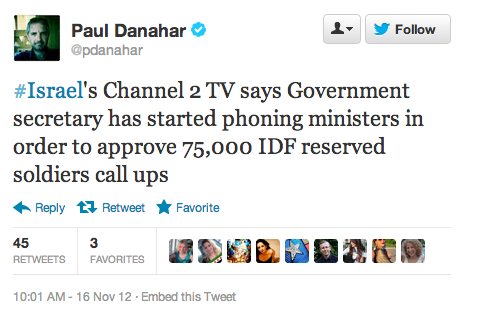
UPDATE 4, 1:00 p.m. PST, Friday, November 16: The Israeli military is claiming that it has destroyed Hamas’ fledgling drone program, according to CBS News. A senior US official also tells the news station that the administration’s greatest concern is the potential of an Israeli ground invasion, which would be a “major escalation.”
UPDATE 5, 6:00 a.m. PST, Saturday, November 17: Hostilities do not show any sign of letting up. According to the BBC, at least 39 Palestinians have now been killed in the conflict, with the Israeli death count holding at three. The office of Hamas Prime Minister Ismail Haniya has been destroyed.
Business Insider takes you inside an Israeli bomb shelter, where Israeli citizens near the border are encouraged to remain.
Mother Sana Kadir who’s 5 children were all injured in Israeli airstrike in Jabalia in #Gaza asks “what have they ever done to hurt Israel”
— Jon Donnison (@JonDonnison) November 17, 2012
A Hamas policeman stands near an unexploded missile fired by an Israeli aircraft. © Majdi Fathi/APA Images/ZUMAPRESS.com)
UPDATE 6, 9:30 a.m. PST, Saturday, November 17: White House Deputy National Security Adviser Ben Rhodes told reporters today that:
We believe that the precipitating factor for the conflict was the rocket fire coming out of Gaza. We believe Israel has a right to defend itself and they’ll make their own decisions about the tactics that they use in that regard…Just to be clear on the precipitating factor: These rockets had been fired into Israeli civilian areas and territory for some time now. So Israelis have endured far too much of a threat from these rocket for far too long and that is what led the Israelis to take the action that they did in Gaza.
Rhodes “disputed that a precipitating factor was the Israeli air strike that killed [the] top Hamas military commander.” He also said that President Obama has spoken with Netanyahu every day since the situation with Gaza began [via the White House Press Office and Laura Meckler of The Wall Street Journal.]
CBS News has posted a surreal video of Israel’s missile defense system intercepting rockets fired by Hamas (needs Flash.)
UPDATE 7, 8:30 a.m. PST, Sunday, November 17: Egyptian President Mohammed Morsi told press late last night: “There are some indications that there is a possibility of a ceasefire soon, but we do not yet have firm guarantees.”
But hostilities continued through Sunday morning, with Israel striking two Gaza media buildings, wounding at least six journalists. Gaza also resumed rocket fire in the morning, firing at civilian areas in southern Israel, according to the Washington Post.
This video, released by the Israeli Defence Forces, shows the attack on media buildings, which, according to the Guardian, included Sky News, al-Arabiya and al-Quds TV:
Israeli officials are saying that Hamas rockets fired into Israel are modified to have less power and a wider range, in order to make an impression on more of the population. An Israeli official told Reuters:
“Our assessment is that the prestige of setting off alarms deep in Israel, and being perceived as fighting on, is as important to them now as spilling our blood.”
UPDATE 8, 7:00 a.m. PST, Monday, November 19:
The Health Ministry in Gaza told the New York Times that the Palestinian death toll has reached 91 with 700 wounded, as of Monday. The Egyptian Prime also told Reuters today that “negotiations are going on as we speak,” and “I think we are close, but the nature of this kind of negotiations (means) it is very difficult to predict.”
UPDATE 9, 9:40 a.m. PST, Monday, November 18:
Hamas and Israel have both released their demands for a truce agreement. According to the Associated Press, top Hamas leader Khaled Mashaal is demanding that Israel lift the economic blockade on Gaza and stop attacking Gaza. The blockade was eased in 2010, but not entirely eliminated, as Israel fears weapons will be transported to Gaza militants. Israeli officials say they’re looking for a long-term solution and international guarantees that Hamas will not start hostilities again later down the road, as well as for Hamas to stop firing rockets at Israel.
UPDATE 10, 1:30 p.m. PST, Monday, November 19:
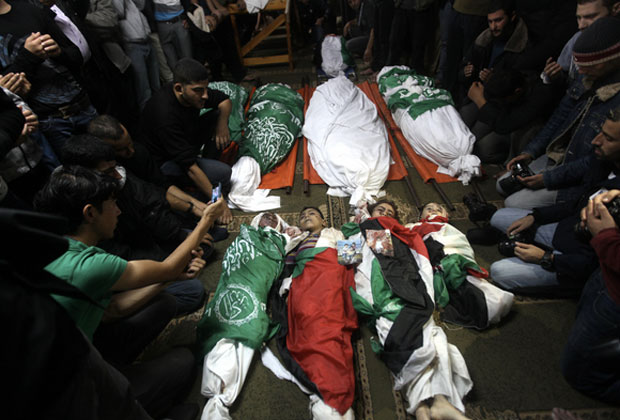 Palestinian mourners gather around the bodies of the al-Dallu family during their funeral in Gaza City. © Majdi Fathi
Palestinian mourners gather around the bodies of the al-Dallu family during their funeral in Gaza City. © Majdi Fathi
According to the New York Times, top Hamas leader Khaled Mashaal is not taking diplomatic efforts to forge a cease-fire seriously, and is instead daring Israel to invade. “If you wanted to launch it, you would have done it,” he told reporters.
The Hamas Health Ministry also reports Monday evening the Palestinian death toll has reached 107.
UPDATE 11, 7:00 a.m. PST, Tuesday, November 20:
The United States is no longer standing on the sidelines of the Israel-Hamas conflict. Today, President Obama sent Secretary of State Hillary Clinton to assist with negotiations. The United Nations secretary general is also expected to arrive today. According to The New York Times:
“Mrs. Clinton will not meet with Hamas representatives on her trip, but with the Palestinian leadership in the West Bank, which is at odds with the Hamas rulers of the Gaza Strip. “We do not engage directly with Hamas” White House Deputy National Security Adviser Ben] Rhodes said.”
And in case you’ve been waiting for a really detailed photo of an Israeli drone…you’re still out of luck:
A Tweet from The Associated Press:
BREAKING: Senior Hamas official says no cease-fire deal with Israel but agreement is close.
— The Associated Press (@AP) November 20, 2012
UPDATE 12, 11:30 a.m. PST, Tuesday, November 20:
Robert Danin, senior fellow at the Council on Foreign Relations, has just returned from the Middle East and is extensively in touch with citizens on the ground in Tel Aviv. He told reporters today that “we’re on the precipice of a ceasefire of sorts, which if it holds, would be very encouraging. The violence has escalated a bit today, which is not surprising, because on the eve of the ceasefire both sides are trying to get the last blow in.”
Even if there is a ceasefire though, Danin said it’s still difficult to pivot that into a peace process. And if a cease fire can’t be reached, he said that there are tens of thousands of Israeli troops poised to go into Gaza, and “that’s a distinct possibility that remains.”
CNN also reports that an Israeli spokesman has echoed remarks made by Israeli president Shimon Peres that Iran is arming Hamas with rockets.
UPDATE 13, 6:00 a.m. PST, Wednesday, November 21:
Today in downtown Tel Aviv, a bomb attack on a public bus injured at least 21 people, according to The Los Angeles Times. The Obama Administration has labeled the violence a terrorist attack. From the Press Secretary:
The United States condemns today’s terrorist attack on a bus in Tel Aviv. Our thoughts and prayers are with the families of those injured, and with the people of Israel. These attacks against innocent Israeli civilians are outrageous. The United States will stand with our Israeli allies, and provide whatever assistance is necessary to identify and bring to justice the perpetrators of this attack. The United States reaffirms our unshakeable commitment to Israel’s security and our deep friendship and solidarity with the Israeli people.
Secretary of State Hillary Clinton has already met with Netanyahu and is expected to meet with the Egyptian president today. Yesterday, diplomats were optimistic that a cease-fire would be imminent after a period of calm, but hostilities are escalating again, according to CNN.
UPDATE 14, 12:00 p.m. PST, Wednesday, November 21:
After eight days of bloodshed, Israel and Hamas have agreed to an Egyptian-sponsored cease fire. Egyptian foreign minister Kamel Amr announced today in Cairo that the end to hostilities would go into effect at 1900 GMT. According to text of the agreement seen by Reuters,
[B]oth sides should halt all hostilities, with Israel desisting from incursions and targeting of individuals, while all Palestinian factions should cease rocket fire and cross-border attacks.
The deal also provides for easing Israeli restrictions on Gaza’s residents, who live in what British Prime Minister David Cameron has called an “open prison”.
According to Israel’s Army Radio (via Google translate), Israel refused Hamas’ call to remove the blockade and siege of Gaza, while Israel’s demand for international approval to launch another offensive if rocket attacks resume, was also denied.
Secretary of State Clinton and President Obama both thanked Egyptian President Mohamed Morsi for his efforts to promote peace in the region.
Senior Hamas lawmaker Ahmed Bahar “hailed the outcome as a triumph,” according to Reuters, while Israeli Prime Minister Benjamin Netanyahu maintained that “more forceful action” might be needed if the ceasefire failed.
The conflict has killed 146 Palestinians and five Israelis to date.
